 Originally posted by RiceHigh
Originally posted by RiceHigh 
Funny that your this "drag the whitepoint to full 255" action is already and purely just pushing up exposure for the "white point" you selected as a reference point (to the brightest) for changing *both* the exposure and contrast of the whole picture, despite that it is just named "contrast adjustment". Afterall, this function *stretches* the histogram to full span and thus change *both* the exposure and contrast, nothing more, nothing less.
Btw, do you know what you are doing actually? :-)
Exposure compensation would apply to all data points. ie: it's like a multiple. increase exposure by 2x and you multiply every point by 2x..... ect.
Contrast just increases the spread from white to black.... Do you know what your talking about. I swear you know less than nothing

Technically w/ exposure compensation the shape of the histogram will not change (much). Take a grey wall and increase exposure. The peak should not spread out, only move along the axis. THIS is exposure adjustments. Stetching the histogram is CONTRAST adjustment...
BTW: Corel Photopaint
AND just a personal rant:
For those that don't like the way Pentax does things, BUY a freaking different camera...... It's not that hard people....
AND a quote from a Nikon user:
Yeah as a Nikon user I can confirm that Nikons suck at overexposing....I prefer the underexposure of the Pentaxes as most of the dynamic range is in the shadows anyway and it's easy to lift them in raw.
Sadly the best solution for Nikon's broken matrix-metering on the D40/D80 is centre-weighted metering. It's not great either but better than dialing in -2.0 exposure compensation :-S
Re: I never realized just *how* badly non-Pentax cameras overexpose...: Re: I never realized just *how* badly non-Pentax cameras overexpose...: Pentax SLR Talk Forum: Digital Photography Review
Good photo of exposure compensation and it's global effect.
 http://www.shortcourses.com/tabletop/lighting1-10.html
http://www.shortcourses.com/tabletop/lighting1-10.html
Just had to add this Nikon users 2 cents (I have nothing against nikon BTW)
Having the D80, which to many has the most unpredictable MM of all Nikons to date, I learned it the hard way, shooting and testing.
The present Nikon MM system depends more heavily on the focus point than other systems, or than older Nikon MM systems. This becomes a big issue if your main subject, where you point the focus to, is darker than most of the image, like a face in shade. The MM will compensate and blow the background easily.
Test this: just go outside and have a tree with leaves part in sun and part in shade. Move focus point from one to the other (w/o moving camera), using A mode. You'll se the shutter speed change accordingly.
Once you learn that, it's very reliable and predictable, and you'll likely miss very few shots.
This -0.7 uniform compensation is completely wrong IMO, it'll make many nice opps into underexposed frames.
Don't use CW, it's a step backward. If you really want perfect exposure, learn a bit about manual exposure and use spotmetering, like I do (except for flash, then MM is just perfect, and no other maker touches the performance of Nikon's TTL flash metering). http://forums.dpreview.com/forums/read.asp?forum=1000&message=29995589 

 Similar Threads
Similar Threads 






 Not quite. Have a look at my gallery.
Not quite. Have a look at my gallery. 
















